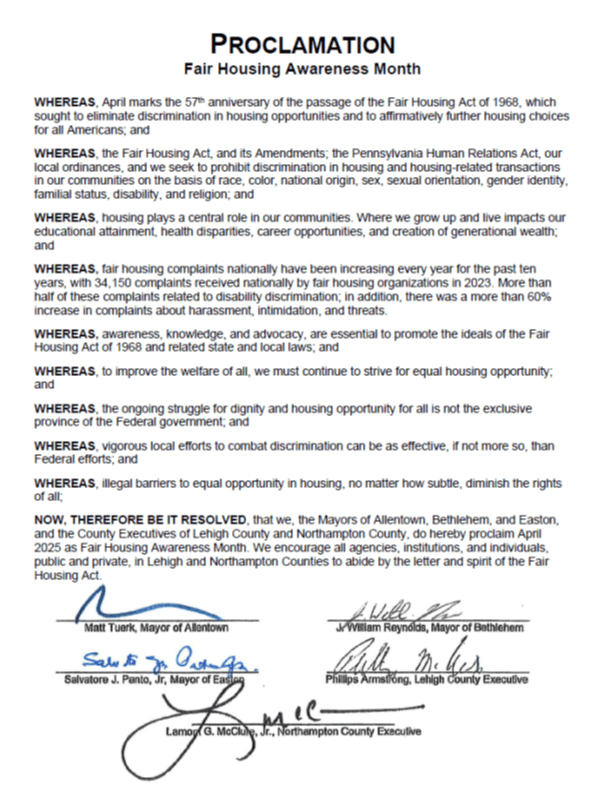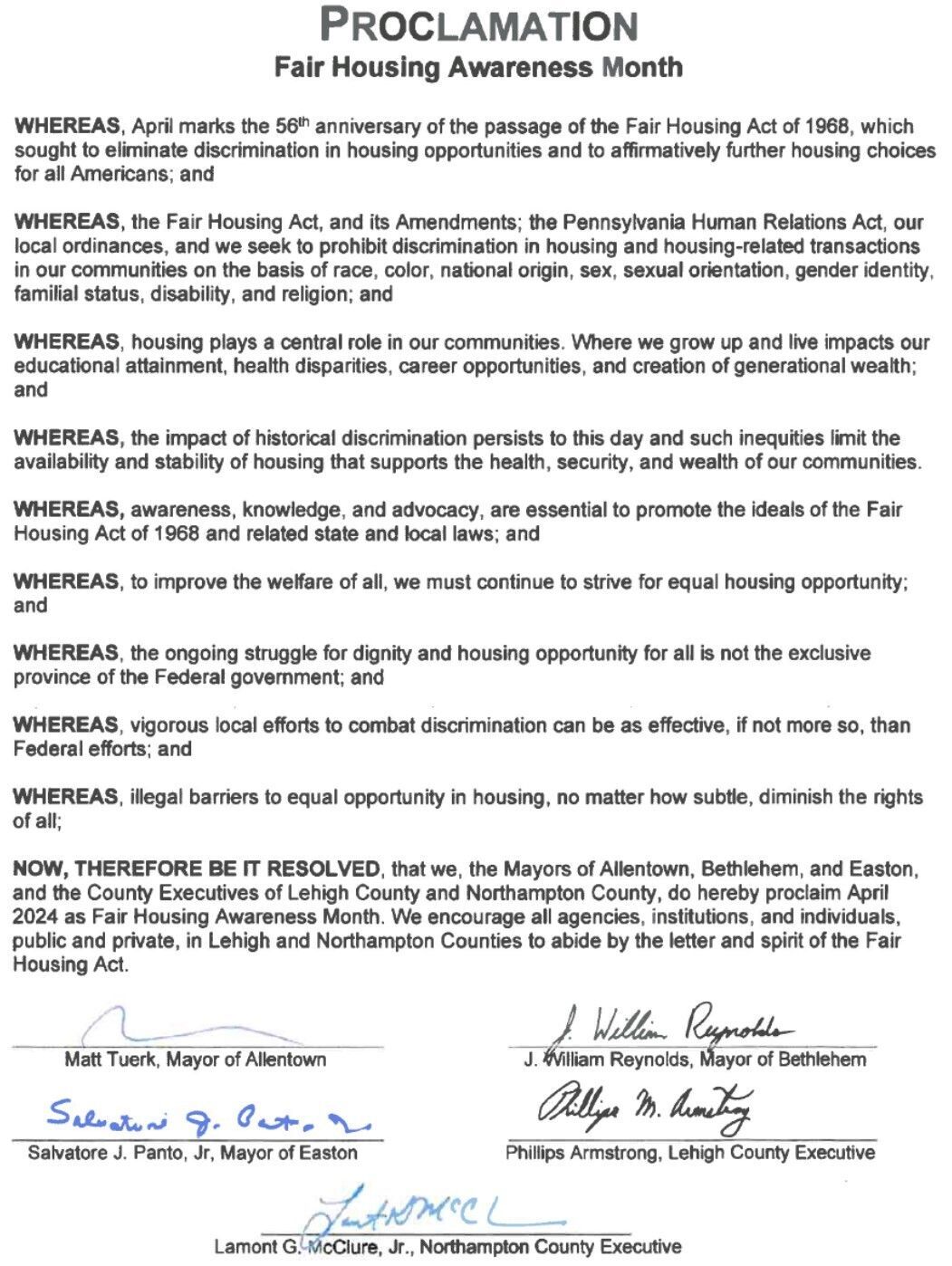Fair Housing & Housing Discrimination

Housing discrimination is treating someone differently because of a particular characteristic that they have. The particular characteristics are called protected classes. Federal, state and local laws promote fair housing and make housing discrimination illegal. The federal Fair Housing Act makes it illegal to discriminate on the basis of race, color, religion, national origin, sex, disability and familial status (pregnant women and adults who have children under 18 years old living with them). The Pennsylvania Human Relations Act prohibits discrimination against the same groups, as well as discrimination on the basis of age, for people aged 40 and older. Local ordinances in Allentown, Bethlehem, Easton, and Pittston make it illegal to discriminate because of a person's sexual orientation and gender identity. Other areas may have similar protections.
If you live in Lehigh or Northampton counties and think you are a victim of housing discrimination, call 610-317-5322.
FAQs
-
Fair housing is another way of saying being able to rent or buy housing without being discriminated against. Fair housing does not mean housing in good condition. Dealing with housing in bad condition is covered in the chapter on Getting Repairs Made.
Fair Housing – Equal Housing Opportunity
Fair housing is another way of saying being able to rent or buy housing without being discriminated against. Fair housing does not mean housing in good condition. Dealing with housing in bad condition is covered in the chapter on Getting Repairs Made.
What is housing discrimination?
Housing discrimination is treating someone differently because of a particular characteristic that they have. The particular characteristics are called protected classes.
Who does the law protect?
The law protects members of protected classes. Under the federal Fair Housing Act, the covered protected classes are:
- Race; Color; National Origin; Religion; Sex; Familial Status (families with children under 18 and pregnant women); and Disability.
In Pennsylvania, the following protected classes are added to the Pennsylvania Human Relations Act:
- Age (40 years old or older);
- People who use a guide or support animal because the person is blind, deaf or has a physical disability,
- People who train or handle guide or support animals,
- People who are related to or associated with people with disabilities.
Local municipalities may add additional protections by local ordinance. State or local government may add or expand protections against discrimination, but they may not take away from federal or constitutional rights.
In some jurisdictions, for example, additional protected classes include:
- Marital Status; Sexual Orientation; Gender Identity and Gender Expression.
What does housing discrimination look like?
Housing discrimination happens in a lot of different ways. Here are some examples:
- Landlord telling you upon meeting you in person that the rent is higher than the advertisement said.
- Advertisement that says “no kids allowed” or “no teenagers”
- Landlord saying on the phone that the apartment is available and then telling you it is not available when the landlord meets you and your same-sex partner
- Landlord saying they won’t rent to someone with a mental health disability
- Real estate agent suggesting you would fit in better in a neighborhood with more African-American residents
- Landlord charging a higher security deposit to a person who uses a wheelchair
- Landlord not making repairs for Latino tenants but making repairs for white tenants
- Landlord refusing to rent to women because the apartment is in an unsafe location
- Landlord charging a higher security deposit to a family with children than a couple
-
Most housing transactions are covered. Renting an apartment or house is covered. How a landlord treats you when you are renting is covered. Buying a condo or house is covered. Getting a mortgage is covered. Working with a real estate agent is covered. Advertising for housing is covered. It is always illegal to discriminate in advertisements for housing, even online advertisements.
What Does the Fair Housing Law Cover?
What behavior/actions does the law cover?
Most housing transactions are covered. Renting an apartment or house is covered. How a landlord treats you when you are renting is covered. Buying a condo or house is covered. Getting a mortgage is covered. Working with a real estate agent is covered. Advertising for housing is covered. It is always illegal to discriminate in advertisements for housing, even online advertisements.
What types of housing does the law cover?
The law applies to most types of housing, including private housing, public housing and subsidized housing. The law applies to manufactured home communities, sometimes called mobile home parks. The law also applies to group homes, transitional housing, rooming or boarding houses, nursing homes, and university housing. Homeless shelters are usually covered too.
What types of housing doesn’t the law cover?
Fair housing law covers most types of housing, but some housing isn’t covered by the law. It’s complicated to know what types of housing aren’t covered.
Under Pennsylvania law a landlord who lives in one of the two units in a building can choose tenants without following fair housing laws. The federal law does not apply when that landlord has four or fewer units in the building. Also, a landlord that owns a few single-family homes may not be covered by the law. A landlord who owns three single-family homes or less and rents them out without using a real estate agent may choose tenants without following fair housing laws.
Senior housing buildings and senior communities do not have to rent to families with children. But the senior buildings and communities must meet certain standards. In some situations, religious groups and private clubs that rent out housing to their members don’t have to follow fair housing laws. You should check with an attorney or fair housing advocate before assuming the law does not protect you or cover your situation.
What if I don’t speak English?
Landlords can’t treat applicants or tenants differently because they don’t speak English or they have an accent. Landlords can only ask for proof of citizenship if they ask all applicants or tenants. They can’t just ask applicants who have an accent or applicants of a certain national origin or race.
If you are pregnant or have children:
It is illegal for landlords to treat families with children differently. Unless a building or community qualifies as housing for older persons, it may not discriminate based on familial status. That means the landlord may not discriminate against families in which one or more children under 18 live with a parent, legal custodian, or the designee of the parent or custodian. Familial status protection also applies to pregnant women and anyone securing legal custody of a child under 18.
You can read more about illegal discrimination in the “Dealing with Situations while Renting” section.
-
If you believe your rights under the Fair Housing Act or the Pennsylvania Human Relations Act have been violated, you should file a complaint with either the Department of Housing and Urban Development (HUD) or the Pennsylvania Human Relations Commission (PHRC) as soon as possible.
Filing a Fair Housing Complaint
Can I file a complaint if I think I have been discriminated against?
If you believe you are being denied housing, evicted or harassed because you are a member of a protected class, you may be protected under the Fair Housing Act and state or local fair housing laws. If you are a person with a disability, you may need to request an accommodation of your disability. If your landlord denies the request or doesn’t respond to the request at all, you may file a complaint for discrimination. Gather any proof you have that you were discriminated against. Proof could include text messages, emails, letters, voicemails. If you were discriminated against in renting an apartment, keep a copy of the advertisement. Write down the property address and the landlord’s name, address and phone number.
Filing a fair housing complaint
If you believe your rights under the Fair Housing Act or the Pennsylvania Human Relations Act have been violated, you should file a complaint with either the Department of Housing and Urban Development (HUD) or the Pennsylvania Human Relations Commission (PHRC) as soon as possible. The deadline for filing a complaint with HUD is one year from the date of the discriminatory action or incident. The deadline for filing a complaint with PHRC is 180 days from the date of the discriminatory action or incident. Some cities have Human Relations Commissions that deal with fair housing complaints.




